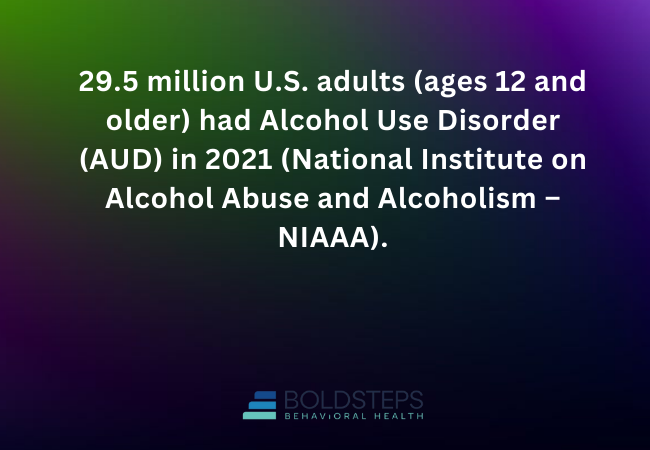Alcohol is one of the most widely used substances in the United States. For many, drinking is a social activity that is part of celebrations, gatherings, and relaxation. However, what may start as casual drinking can slowly progress into alcohol dependence or addiction.
The transition from social drinking to problematic drinking often happens gradually, making it difficult to recognize. Knowing the warning signs of alcohol addiction is essential to prevent long-term consequences and seek the right treatment before alcohol takes control of your life.
At Bold Steps New Hampshire, we provide comprehensive alcohol addiction treatment, including our Alcohol Addiction Rehab Program, Alcohol Addiction Treatment Program, Partial Hospitalization Program (PHP), Intensive Outpatient Programs (IOP), Outpatient Treatment Program, Medical Detox Program, Virtual Treatment Program, and services through our Behavioral Health Treatment Center in New Hampshire.
If you or a loved one are concerned about drinking habits, this guide will help you recognize the signs of alcohol addiction, its risks, and available treatment options.
Understanding the Spectrum: Social Drinking vs. Alcohol Addiction
What is Social Drinking?
Social drinking refers to moderate alcohol consumption in settings such as:
- Casual gatherings with friends and family
- Work or networking events
- Celebratory occasions like weddings or holidays
A social drinker:
- Drinks occasionally and in moderation
- Does not experience cravings or withdrawal
- Can choose not to drink without difficulty
- Does not engage in reckless behavior due to drinking
When Does Social Drinking Become a Problem?
For some individuals, social drinking can escalate into problem drinking when alcohol is consumed more frequently and in larger amounts.
Warning signs that drinking may be becoming a problem:
- Drinking to cope with stress or emotions rather than for enjoyment.
- Needing more alcohol to achieve the same effects (increased tolerance).
- Drinking more often, even alone or in secret.
- Feeling guilty or ashamed about drinking habits.
- Experiencing withdrawal symptoms when not drinking.
If alcohol consumption starts affecting daily life, relationships, work, or mental health, it may be a sign of alcohol use disorder (AUD), commonly referred to as alcohol addiction.
Warning Signs of Alcohol Addiction
1. Loss of Control Over Drinking
Individuals struggling with alcohol addiction find it difficult to control the amount they drink. They may plan to have one or two drinks but end up drinking much more.
2. Increased Alcohol Tolerance
Over time, the body adapts to alcohol, requiring a person to drink larger quantities to feel the same effects. Increased tolerance is one of the earliest signs of alcohol dependence.
3. Drinking to Cope with Stress, Anxiety, or Depression
If drinking becomes a way to self-medicate emotional pain, it increases the risk of addiction. Alcohol is often used to numb stress, trauma, or mental health struggles, leading to dependency over time.
4. Experiencing Withdrawal Symptoms
If you feel shaky, nauseous, anxious, or irritable when not drinking, your body may be physically dependent on alcohol. Common withdrawal symptoms include:
- Sweating and tremors
- Headaches or nausea
- Mood swings or depression
- Difficulty sleeping
5. Drinking Despite Negative Consequences
Continuing to drink even when it causes harm—such as job loss, relationship problems, or health issues—is a major sign of addiction.
6. Hiding or Lying About Drinking
Individuals struggling with addiction often hide alcohol, drink in secret, or lie about their drinking habits to avoid judgment.
7. Neglecting Responsibilities Due to Drinking
If drinking starts interfering with work, school, or family obligations, it’s a sign that alcohol is taking priority over daily life.
8. Drinking at Inappropriate Times or Alone
Drinking in situations where it was previously uncommon (such as the morning, before work, or alone) suggests problematic alcohol use.
9. Loss of Interest in Other Activities
Alcohol addiction often leads to disinterest in hobbies and activities that once brought joy, as drinking becomes the main focus.
10. Unsuccessful Attempts to Cut Back
Trying to quit drinking but relapsing repeatedly is a key indicator of alcohol addiction. This cycle can lead to frustration, guilt, and feelings of hopelessness, making professional treatment crucial.
The Dangers of Untreated Alcohol Addiction
Ignoring the warning signs of alcohol addiction can result in severe physical, emotional, and social consequences.
Physical Health Risks
- Liver disease (cirrhosis, fatty liver, alcoholic hepatitis)
- Heart problems, high blood pressure, and stroke risk
- Increased cancer risk (liver, breast, esophageal, colorectal)
- Weakened immune system, leading to frequent illness
Mental and Emotional Health Risks
- Increased risk of anxiety and depression
- Memory loss and cognitive impairment
- Higher likelihood of suicidal thoughts or behaviors
Social and Relationship Consequences
- Strained relationships with family and friends
- Job loss and financial struggles
- Legal issues, including DUI arrests
Seeking professional treatment early can prevent these consequences and improve overall well-being.
How Alcohol Addiction is Treated
At Bold Steps New Hampshire, we offer comprehensive alcohol addiction treatment programs tailored to each individual’s needs.
1. Medical Detox Program
For those experiencing withdrawal symptoms, our Medical Detox Program provides:
- 24/7 medical supervision
- Medication-assisted treatment (MAT) to ease withdrawal symptoms
- A safe, supportive environment to start recovery
2. Alcohol Addiction Rehab Program
A structured treatment plan that includes:
- Individual therapy (Cognitive Behavioral Therapy, Dialectical Behavior Therapy)
- Group counseling and peer support
- Holistic approaches (meditation, nutrition, exercise)
3. Partial Hospitalization Program (PHP)
PHP offers intensive treatment during the day while allowing individuals to return home at night. It provides:
- Daily therapy sessions
- Psychiatric care and medication management
- Relapse prevention strategies
4. Intensive Outpatient Programs (IOP)
IOP offers flexible therapy for those transitioning back into everyday life while maintaining structured support.
5. Outpatient Treatment Program
For individuals in long-term recovery, outpatient treatment provides:
- Ongoing counseling
- Relapse prevention strategies
- Support groups for continued accountability
6. Virtual Treatment Program
We offer online therapy and remote counseling, ensuring accessible treatment for those unable to attend in person.
7. Behavioral Health Treatment Center in New Hampshire
Our center provides comprehensive care for addiction and mental health, including:
- Family counseling
- Trauma-informed therapy
- Life skills development
When to Seek Help for Alcohol Addiction
If you or someone you love is showing signs of alcohol addiction, it is never too early or too late to seek help.
Take the First Step Toward Recovery
Alcohol addiction can have devastating effects, but recovery is possible with the right treatment and support. At Bold Steps New Hampshire, we provide personalized, evidence-based treatment programs to help individuals achieve lasting sobriety. Call (603) 915-4223 today to speak with a treatment specialist and explore the best program for you. Your journey to recovery starts with one bold step—take yours today.
Frequently Asked Questions (FAQ)
How do I know if my drinking has become a problem?
If your drinking is affecting your relationships, work, health, or daily life, it may be a sign of alcohol addiction. Common warning signs include drinking more than planned, feeling cravings, experiencing withdrawal symptoms, or using alcohol to cope with stress or emotions.
What are the early warning signs of alcohol addiction?
- Increased tolerance (needing more alcohol for the same effect).
- Drinking alone or at inappropriate times (such as in the morning).
- Neglecting responsibilities due to drinking.
- Feeling guilty or ashamed about drinking habits.
- Experiencing withdrawal symptoms when not drinking.
- Failed attempts to cut back or quit drinking.
What happens if alcohol addiction goes untreated?
Untreated alcohol addiction can lead to severe health risks, including liver disease, heart problems, mental health disorders, relationship breakdowns, job loss, and legal issues. Seeking professional treatment early can prevent these consequences.
What treatment options are available for alcohol addiction?
At Bold Steps New Hampshire, we offer:
- Medical Detox Program – Safe withdrawal management with medical supervision.
- Alcohol Addiction Rehab Program – Structured inpatient and outpatient treatment.
- Partial Hospitalization Program (PHP) – Intensive therapy during the day, with the ability to return home at night.
- Intensive Outpatient Programs (IOP) – Flexible therapy while maintaining daily responsibilities.
- Outpatient Treatment Program (OP) – Long-term support for sustained sobriety.
- Virtual Treatment Program – Online therapy for those unable to attend in-person sessions.
How do I know if I need detox before treatment?
If you experience shaking, sweating, nausea, anxiety, or difficulty sleeping when not drinking, you may need medical detox to safely manage withdrawal symptoms. Detox is the first step in alcohol addiction treatment and should be done under medical supervision.
Can I recover from alcohol addiction without professional help?
While some individuals may attempt to quit on their own, professional treatment provides a much higher success rate by offering therapy, medical support, and relapse prevention strategies. Many people struggle with relapse without structured treatment.
How can I help a loved one who may have an alcohol problem?
Encourage them to seek professional help, express your concerns with compassion and support, and provide resources such as treatment options at Bold Steps New Hampshire. Avoid enabling behavior and set healthy boundaries.



